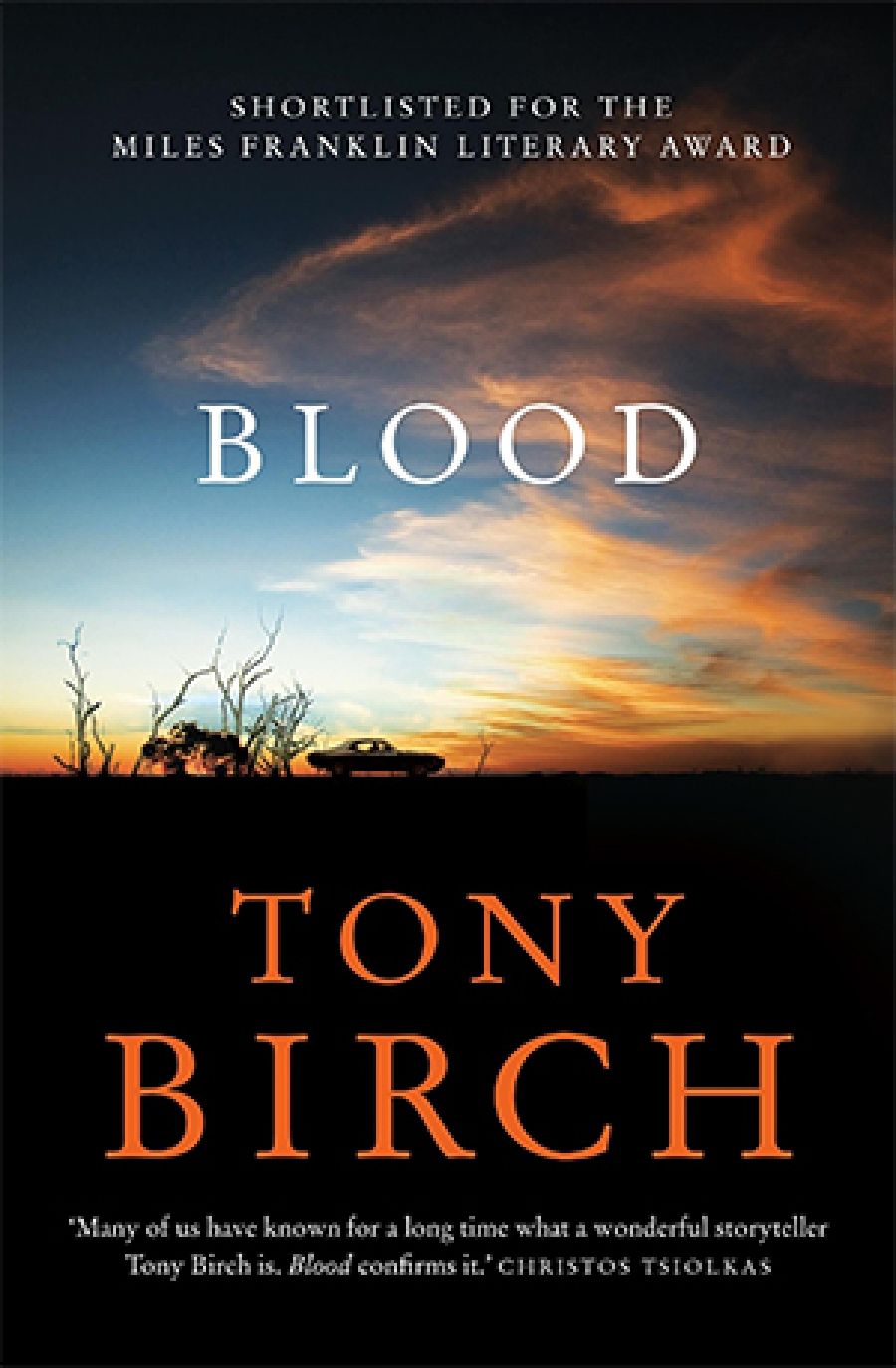
- Free Article: No
- Contents Category: Fiction
- Review Article: Yes
- Online Only: No
- Custom Highlight Text:
As Christos Tsiolkas notes in his back cover puff, Tony Birch’s storytelling skills have been widely acknowledged since the publication of Shadowboxing in 2006. Many people have been waiting to see how Birch would fare with a full-length novel. His début, Blood, is nothing short of outstanding. Birch has finally found a home at University of Queensland Press, where he has his staunch champion, John Hunter, who published Birch’s previous book of short fiction, Father’s Day (2009) under his own imprint, Hunter.
- Book 1 Title: Blood
- Book 1 Biblio: University of Queensland Press, $29.95 pb, 288 pp
Wearing the influence of Charles Laughton’s magnificent film The Night of the Hunter (1955) proudly on its sleeve, Blood chronicles the journey of thirteen-year-old Jesse and his half-sister, Rachel, five years his junior. Their wretched mother Gwen is a walking advertisement as to how not to be a parent. Profane, chain-smoking, working in strip bars, jumping into bed with a string of tattooed jailbirds, using Jesse as a drug mule – Gwen comes across as thoroughly despicable. It is only when her father confesses to failing his daughter after her mother’s death and his subsequent descent into violent alcoholism that we begin to have a glimmer of sympathy for her.
A monstrous creation, Gwen constantly places her children at risk, much to Jesse’s frustration. He and Rachel have been separated once before; they spent time in foster care when Gwen overdosed. Jesse has no intention of returning to his mother; from early on it is clear he intends to flee, preferably with Rachel in tow. Gwen has an inkling of his desire for freedom, and puts her foot down at every opportunity.
Gwen slammed the fist into her own chest and started crying. ‘I’m your mother. Don’t you ever forget it. I take care of you. No one else. And if you play up I can get rid of you anytime. One call to welfare and you’re off. Both of you. Don’t fucken push it.’
Birch’s use of language is masterful, not only in his simple, vivid descriptions of the rural Victorian landscape, but also in the realistic vernacular running throughout the dialogue. Absent are the ockerisms and clichés that plague too many social-realist Australian novels. Where many writers are reduced to imagining how marginalised people speak, Birch has evidently drawn from his experience as an outreach worker visiting schools (including, deliciously, several he was expelled from as a student) to underpin the contemporary speech patterns of his characters. Consequently, Blood has a freshness of tone and determined vigour that are frequently lacking in the work of many male Australian writers. This is old-school skill combined with a modern outlook. Blood is among the most convincing Australian novels I have read in recent years. The fact that it has also been superbly edited is a further boon.
After frustratingly brief stays with affable ex-con Jon Dempsey, who bakes cakes for the children and becomes the first real father figure Jesse has ever had, and with Gwen’s reformed father, who buys them their first Christmas gifts before Gwen snatches the children, depriving them of any nascent happiness, Jesse and Rachel finally get their chance to escape this turmoil. When Gwen becomes involved with methamphetamine dealer Ray Crow in Adelaide, the novel moves into more apocalyptic territory. Birch sends the children off on their own, fleeing for their lives. Crow and his offsider, Limbo, step fully formed out of a gritty 1970s crime novel. One is reminded of characters in Edward Bunker’s No Beast So Fierce (1973) or Donald E. Westlake’s Parker novels (written under the pseudonym Richard Stark). Their nefarious intentions provide a counterbalance to those of the other, more kindly male adult characters we have encountered thus far.
As if the novel wasn’t good enough already, Birch finds another gear in the pulsing final act of the narrative. With Crow and Limbo in pursuit of the children across a bleak, rain-drenched landscape, Birch captures moments of beauty reminiscent of the dream-like river sequence in Laughton’s film when John and Pearl elude Robert Mitchum’s unhinged preacher, who screams maniacally from the reeds. Jesse and Rachel, for their part, encounter an eerie abandoned theme park filled with miniatures of world monuments, and seek shelter in a cave adorned with Aboriginal paintings. The haunting scene when Jesse and Rachel emerge from an underground irrigation channel on the edge of Melbourne at sunset and are greeted by a group of unexpectedly friendly teenage skaters speaks volumes about Birch as a writer. Along with his profound understanding of place is a compassion for youth rarely seen in fiction.
Some critics have often derided contemporary Australian fiction as lacklustre and uninspired, but with fresh work recently released or forthcoming from Kate Grenville, Elliot Perlman, Alex Miller, Peter Carey, and a cavalcade of exciting young writers falling into step right behind, the outlook could hardly be rosier. The competition for literary awards in 2012 promises to be the fiercest in some time, but on this evidence Tony Birch could take home a few prizes, deservedly so. Blood is a humanist masterpiece that has been worth the wait.


Comments powered by CComment